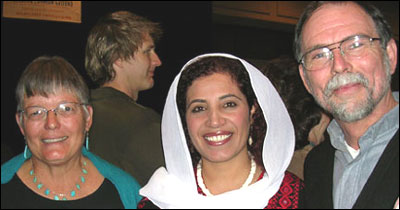![]()
Encountering a Bedouin
Feminist
By Fr. Dave Denny

Tessa Bielecki, Amal Elsana Alh'jooj and
Fr. Dave Denny met at the second
annual Circles of Change breakfast in Denver.
Amal Elsana Alh’jooj is an Israeli native and a Bedouin from the desert. She was her parents’ fifth daughter; they had no sons. Traditional Bedouin families prize sons more than daughters, and her mother wondered whether her father would find a second wife who might give him sons; she couldn’t stop crying. Her husband assured the mother of his daughters that he would not take a second wife. He named this fifth child Amal, which means “Hope,” trusting in whatever Allah provides. Over the next years, Amal’s mother gave birth to five sons! But Amal says she was raised as a boy as much as a girl. She was a shepherd at five years old. When her brothers began heading to Haifa for college, she expected to go, too. But her father said, “No, not you. You’re a girl.” Her place was in the home. She knew that “something unfair was happening” around her and began, as she put it, to “revise my image of the tribe.” She set out to change her tribe.
At age seventeen, aware that Bedouin men received credit for work often accomplished by women, she founded the first Bedouin women’s group. She also convinced her father to send her to college. Because of this, her father’s car was burned. The following year an Israeli journalist asked if she was a “feminist.” She had never heard the word. The journalist said that feminists work for equal rights for women. Amal said, “Thank you very much. This is me!” But when her photograph appeared in newspapers as the first Bedouin woman to attend university, it brought “shame” on her family. She speaks fondly of her father, who broke with tradition in order to support his radical daughter. He, too, had never heard the word “feminist.” A friend told him that feminists were American women who danced in the streets and burned their bras in public. But by acting to improve her community, Amal dispelled this ignorant caricature. She learned an invaluable lesson: if she truly loves her community, respects and listens to its members, they will not excommunicate her.
Amal was recently honored at the second annual Seeking common Ground—Circles of Change awards breakfast in Denver. She manifested an attitude I witnessed last May on our fact-finding visit to Israel/Palestine sponsored by Friends of Sabeel—Colorado: Amal refuses to see herself or her community as victims. She said it would be easy to cry over her people’s minority status, over the injustices meted out to her unrecognized village in the Negev. Instead, since 2000, she has worked with the Negev Institute for Strategies of Peace and Development (NISPED) and NISPED’s Arab-Jewish Center for Equality, Empowerment and Cooperation (AJEEC) to achieve equal human and civil rights in Israel.
Amal trusts that deep inside, Jewish and Palestinian Israelis seek justice and cooperation. The gap between these two communities is so great that although they share the same land, members of one community can live without ever meeting the other. Noting that for most Israeli Arabs and Jews, there are only two spaces: “ours” and “theirs,” Amal set out to create a “third space” shared between Jews and Arabs in an atmosphere of respect, understanding, and equal opportunity. She believes that development is not about physical structures; it is about people and attitudes. Nor is she interested in a revolution against anyone. Instead, she encourages a process, a conversation between neighbors. Giving citizens a chance to say what they need and creating ways to meet those needs opens new spaces of cooperation and hope. Work accomplished at the grass roots level heightens people’s sense of ownership, which leads to good stewardship. Alh’jooj’s attitude and work must be contagious: in her years with NISPED and AJEEC, the number of volunteers has grown from 47 to 350. And now 482 Bedouin women attend university.
Seeking Common Ground is a non-profit organization whose Building Bridges for Peace program brings together young women (16 -19) from Israel, Palestine and the United States to participate in an intensive summer program that includes training in communication, leadership, peacemaking, and women’s empowerment.
In addition to Alh’jooj, SCG’s Circles of Change Breakfast honored Saul Garlick and Jim Lyons. Garlic is the 24-year-old founder of Student Movement for Real Change, whose mission includes building schools in South Africa and delivering clean water to villages in Kenya. Jim Lyons won recognition for his service in the Clinton administration and the International Fund for Ireland. His time in Northern Ireland convinced Lyons that no problem is intractable, and that bringing creative impatience into intolerable situations can help create a neutral space where enemies may meet rather than collide. Amal Elsana Alh’jooj shows that such a strategy is not romantic or impractical. It works.
If you want to visit Alh’jooj’s
community in the Negev, you may join SCG’s
Trip for Peace, Empowerment, and Change
in January.